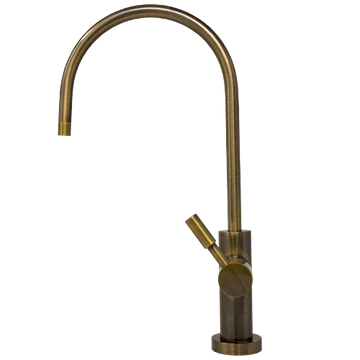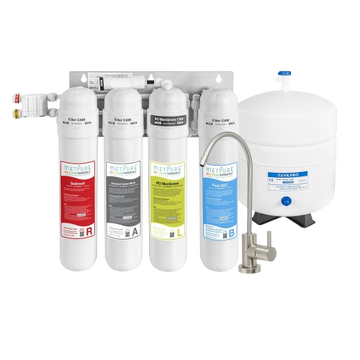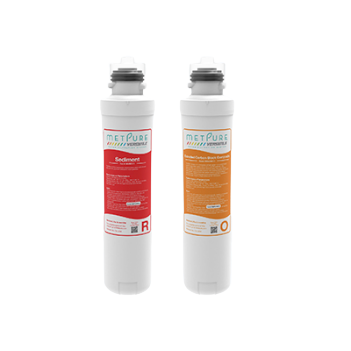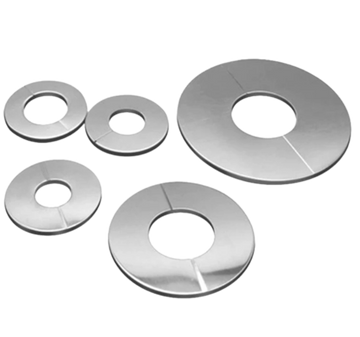A plumbing system is an intricate system of various pipes, valves, and connectors, enabling a smooth transport of water. Be it residential plumbing or a system for your office, these components play a vital role in controlling the flow of water. Hence, choosing the right components is vital for the success of your plumbing project. In this article, we'll discuss both shut-off valves and supply lines that may help you decide what meets your project’s requirements.
Shut-Off Valves

Shut-off valves play a critical role in controlling the flow of liquids within a variety of applications. These devices act as gatekeepers, allowing for the regulation of fluid. In this section, we delve into the significance, types, and applications of shut-off valves.
Brass Valves
Brass valves are the pillars of the plumbing world. With their durable construction, they have been a prime component for decades. These valves are known for their robustness and corrosion-free properties, making them a suitable choice for a wide range of applications.
The essential properties derive from the composition of brass – an alloy of copper and zinc. Its innate properties make it a perfect choice for valves. Since it doesn’t get oxidized, it won't degrade when in contact with water. This means that your brass valves will continue to function reliably for many years, providing you with peace of mind.
Brass valves are reliable for controlling water supply to one fixture or managing flow for a whole plumbing system. Check out a broad collection of brass valves by Metpure.
Stops & Risers
Stops and risers are essential for adjusting your plumbing system. They act as the bridge between the water supply and the appliances you're connecting.
People commonly use stop valves for toilets and faucets because they are designed for these applications. On the contrary, Risers offer more flexibility with their adjustable length. Therefore, whether to choose stops or risers solely depends on your project's needs and the level of control.
Stops come in various types, including Compressed Angle Shut Offs, CPVC Angle Shut Offs, PEX Angle Shut Offs, or Push Fit Angle Shut Offs. These options allow you to select the most viable connection method based on your plumbing setup. For instance, people use compression stops to attach supply lines to faucets, while they use sweat stops with copper pipes.
Risers are helpful because they can be adjusted to fit the required size. This flexibility enables the connection of fixtures that are not perfectly aligned with the water supply. This ensures a tight fit and a secure connection, reducing the risk of leaks.
Water Filtration Connectors
Water filters are crucial for keeping your water pure and clear. A reverse osmosis system or any other filtration device uses these connectors to maintain a healthy water supply.
When selecting water filtration connectors, it's essential to consider the type of water shut-off valve under-sink that is compatible with your filtration system. Different filtration systems may require specific connectors to ensure a proper fit. Therefore, research your filtration system and choose connectors that are designed to work with it.
Using incompatible connectors can result in leaks that can be a hassle on their own. The size of the connectors should also match the water supply lines and the filtration system. Mismatched sizes can lead to ineffectiveness.
Additionally, consider the materials used in the connectors. Stainless steel and brass connectors are strong and don't rust, so they're great for keeping water clean. Metpure offers 14 different types of water filtration connectors that you may find useful.
Supply Lines

Supply lines are a vital part of plumbing, connecting the main water supply to fixtures. This section explores their types, materials, and applications, highlighting their essential role in plumbing systems, from flexible stainless steel to durable braided options.
Corrugated Stainless Steel Lines
Corrugated stainless steel lines have a reputation for being flexible and strong. These lines are ideal for connecting appliances where rigid pipes would not be a practical option. They are highly resistant to corrosion and provide a long-lasting solution.
The design of these lines allows them to bend and flex without compromising their structural integrity. This feature makes them particularly useful for applications where rigid connections are not feasible. For instance, when connecting a dishwasher, washing machine, or kitchen sink shut-off valve, it will ensure a leak-free connection.
Stainless steel resists corrosion. Therefore, your supply lines will remain strong, even when in contact with water for an extended period. This durability is essential for appliances that rely on a consistent water supply for their operation.
Explore the corrugated stainless steel lines by Metpure.
Faucet Supply Lines
Faucet lines give a constant water supply for washing, cooking, and personal hygiene without any interruptions. When choosing faucet supply lines, consider the length, material, and connector type. This will ensure a smooth installation that won't interrupt your daily routine.
The length of your faucet supply lines is a critical consideration. These lines must be long enough to connect your faucet to the water supply without excessive tension or bending. Make sure to check the distance between your faucet and the water supply. This will ensure that you select the appropriate length for the shut-off valve under the sink or behind the toilet.
The material of your supply lines also matters. Braided lines are popular choices because of their durability and resistance to corrosion. These materials make your supply lines reliable over time, even when exposed to moisture.
Check out faucet supply lines by Metpure.
Toilet Supply Lines
Toilet supply lines bring water to your toilet and help prevent leaks and water damage. When selecting toilet supply lines, look for quality materials and reliable connectors. A good bathroom needs a connection that doesn't leak. This means the water valves under the sink must be in good condition.
Toilet supply lines typically come in two materials: stainless steel and braided. Stainless steel lines are strong and do not rust. This makes them an excellent choice for a durable and reliable connection to your toilet. Braided lines offer flexibility and ease of installation, making them a popular choice for DIY enthusiasts.
The type of connectors on the toilet supply lines also influences the installation process. Compression connectors are easy to install, as they require no special tools, making them suitable for DIY projects. Threaded connectors are traditional and secured with a wrench for added leak protection.
Click on the link and explore toilet supply lines by Metpure.
Appliance Water Supply Lines
Appliance water supply lines should integrate your appliances and the water supply. Different appliances may have varying connection requirements. Ensure that the supply lines you select are compatible with the specific make and model of your appliances. Certain appliances need special connectors for high water pressure or high-temperature use, like the under sink valve.
Check out Metpure’s appliance water supply lines collection here!
Choosing the right valves and supply lines is important for your plumbing system to work well for a long time - an investment in reliability and functionality. With the ability to turn off the water quickly and easily, selecting the appropriate shut-off valves and supply lines ensures your project operates without a hassle.














